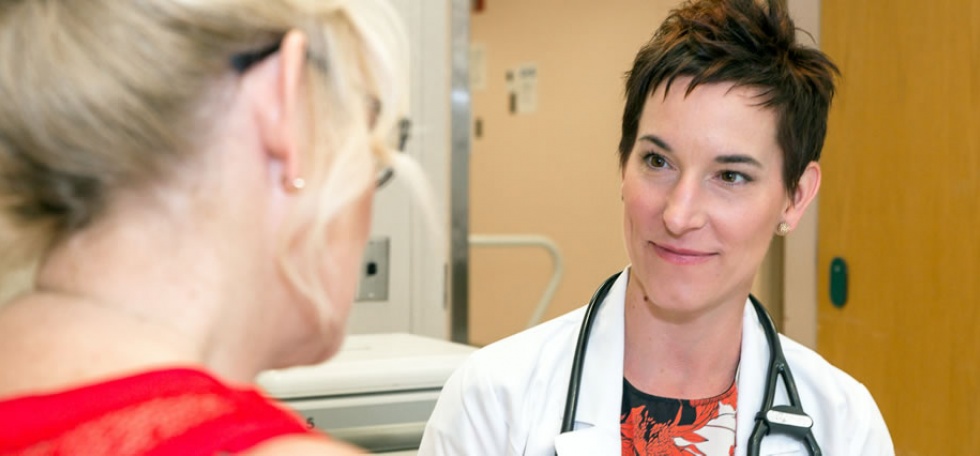Dr. Erika Penz

Dr. Penz is a respirologist and faculty member at the Division of, Respirology, Critical Care and Sleep Medicine at the University of Saskatchewan. Dr. Penz has research training and expertise in health economics and health policy, specifically cost-effectiveness analysis alongside clinical trials, use of decision analytic models in cost-effectiveness studies, and systematic review and meta-analysis in diagnostic accuracy studies. She is a researcher, investigator, and collaborator on a number of projects, including evaluating lung cancer screening and costs of care, sleep-disordered breathing diagnostic pathways, chronic inflammation in the lung, COPD clinical pathway implementation and the effect of tele-health interventions on patient satisfaction, wait times and healthcare resource utilization. Dr. Erika Penz is studying the survival and healthcare use of patients with lung cancer in Saskatchewan and ultimately hopes that this research will improve care for these patients.
What is health economics?
Health Economics is the study of how society decides WHAT, HOW, and FOR WHOM to produce health care and ultimately explores the impact of these decisions on health. The field of health economics concerns itself with how resources are allocated in order to maximize overall health for society.
What got you interested in health economics research?
Well this is a bit of a long story…
My interest in how we make decisions in healthcare started back in graduate school when I was completing my Master’s degree in Health Policy. I took an introductory course in decision analysis, which is a field of study that attempts to quantify decision making. It evaluates a range of alternative scenarios (such as how we might treat a health condition), by incorporating all potentially important outcomes (good and bad) associated with the various treatments, and identify the most optimal decision that maximizes society’s or a population’s health.
This initial interest in decision analysis was put on hold as I applied to medical school at the end of my graduate degree and spent the next 9 years studying to become a physician. Once I finished my medical training, it became clear to me that the study of health economics, particularly how we decide whether we should provide and pay for new medicines, tests, or healthcare programs in our health system, was an increasingly critical issue in our health system. Given that we are faced with a limited healthcare budget, we can’t pay for every new technology that is developed. And if we do make a decision to pay for a new technology, it most certainly means that something else may not be paid for. I believe that having a structured and transparent approach to making these decisions is better than someone’s best guess or gut feeling. And the reality is that decisions about what to fund and what not to fund have to be made and I wanted to have the skills and expertise to help decision makers make these decisions, in a transparent way.
You’ve researched the cost-effectiveness of lung cancer screening in Saskatchewan. What inspired this research?
My interest in this topic was sparked after a very important clinical trial published their findings that screening individuals who smoke cigarettes with a CT scan of the chest could diagnose more lung cancers and prevent death from lung cancer. Up until that point, there had been no test capable of reducing the risk of death from lung cancer. As a physician, I see almost every day the frightening burden that lung cancer has on my patients. It is the leading cause of cancer death in the world and given our aging and growing population, it is expected that lung cancer will continue to grow. The other reality is that performing CT scans on people who are asymptomatic but at risk of lung cancer can be expensive and whether the benefits of lung cancer screening outweigh the costs is unknown at this time. This is where cost-effectiveness analysis can be very helpful to try and provide some understanding of the ‘value for money’ associated with lung cancer screening.
What impact could understanding the cost-effectiveness of lung cancer screening have in Saskatchewan?
Lung cancer screening has the potential to save lives. However, how we implement a screening program (i.e. who is eligible for screening, how often we screen, and for how long we screen) is critical to whether a lung cancer screening program will be good value for money for Saskatchewan people. Our research attempts to answer this question so that the decision makers in our province have the best available information to make this decision in the best interest of our Saskatchewan residents.
What research projects are you working on now or looking forward to exploring in the future?
At the moment I am studying the survival and healthcare use of a cohort of patients with lung cancer in Saskatchewan. Although I am privy to my individual patients’ stories of their experience with lung cancer, my research has been able to highlight both the personal and societal burden that lung cancer has placed in our province through the study of thousands of individuals diagnosed with this terrible disease.
As an extension of this work, and with the support of the Lung Sask, I intend to study the survival, premature life-years lost and productivity loss associated with lung cancer in our province and compare these outcomes in patients who also have a diagnosis of COPD and lung cancer, where I predict the burden of disease is even greater.
Ultimately, my hope is that our research will lead to improved understanding of and care for these patients.
